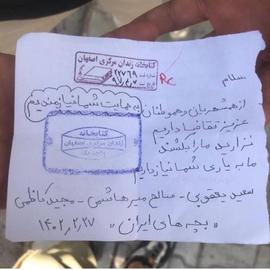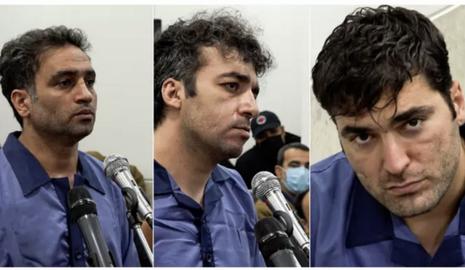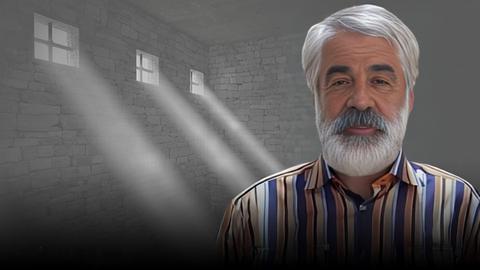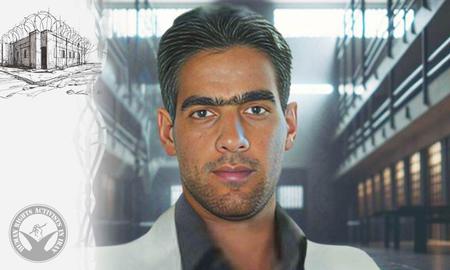Iranian authorities have executed three men accused of deadly violence during last year’s anti-government protests, triggering angry demonstrations inside Iran and widespread condemnations abroad.
Mizan, the judiciary’s website, announced that Majid Kazemi, 30, Saleh Mirhashemi, 36, and Saeed Yaqoubi, 37, were executed at dawn on May 19 in Dastgerd prison in the central city of Isfahan.
Security forces secretly buried the three bodies in and around Isfahan, according to information obtained from 1500tasvir activists.
The group said that Yaqoubi's body was buried in a village in Isfahan. Mirhashemi was laid to rest in Baltaq, a village in Boyin and Miandasht, while Kazemi was buried in the Habibabad cemetery of Isfahan.
Iranian authorities claim the trio was implicated in the deaths of two members of the Basij paramilitary force and a law enforcement officer during nationwide protests in Isfahan in November.
Human rights groups say the three were deprived of access to their chosen lawyers, subjected to torture and pushed into "forced confessions."
On May 18, Kazemi, Mirhashemi and Yaqoubi appealed to the public for support in a handwritten note saying, "Don't let them kill us.”
News of their executions and secret burials sparked a significant backlash among Iranians. Multiple groups, including the "Youths of Isfahan and Suburbs," called for strikes and protests against the Islamic Republic.
In Tehran neighborhoods, including Tehranpars, Negin Gharb, Saadatabad and Tehransar, outraged protesters voiced their anger with chants such as "Death to the youth-killing government," "Death to the killer [Ali] Khamenei," referring to the Islamic Republic’s supreme leader.
In the south-easter city of Zahedan, Iran's most prominent Sunni cleric said that the authorities’ increasing use of the death penalty will not succeed in quelling popular calls for fundamental reforms.
"A nation can’t be suppressed by executions," said Molavi Abdulhamid, the Sunni Friday prayer leader of Zahedan.
"They are a consequence of a distorted interpretation of religion,” the 76-year-old cleric added. “I want to assure the global community that these executions are in no way representative of the Islam religion.”
After Friday prayers, Zahedan residents took to the streets for weekly protests and shouted slogans against the Islamic Republic and Supreme Leader Ali Khamenei.
Human rights organizations also condemned the execution of the three men, with the Norway-based Iran Human Rights group calling on the international community to "use all its powers to stop the Islamic Republic’s killing machine."
Amnesty International’s Secretary-General Agnes Callamard said that Kazemi, Mirhashemi, and Yaqoubi, were executed only because they were protesting.
“Our thoughts go out to their families and friends. The Islamic Republic of #Iran uses death penalty to instill fears, to quash dissent. Unconscionable,” Callamard wrote in a tweet.
The executions were also condemned by Western governments, with Australian Foreign Minister Penny Wong saying that they exemplify “the regime’s brutality against its people.”
“We condemn these reprehensible killings in the strongest possible terms,” she tweeted, adding that Australia “stands with the people of Iran.”
Campaigners have denounced the Islamic Republic's escalation of executions in recent weeks and accused the authorities of using the death penalty as a means to intimidate Iranians.
Iranian authorities have cracked down hard on months-long nationwide protests sparked by the September death of 22-year-old Mahsa Amini while in police custody.
More than 520 people were killed during demonstrations and over 20,000 others were unlawfully detained, activists say. Following biased trials, the judiciary has handed down stiff sentences, including the death penalty, to protesters.
The demonstrations have subsided in recent weeks, but there are still sporadic acts of defiance, including the refusal of a growing number of women to wear the mandatory head covering in public places.
visit the accountability section
In this section of Iran Wire, you can contact the officials and launch your campaign for various problems






















comments